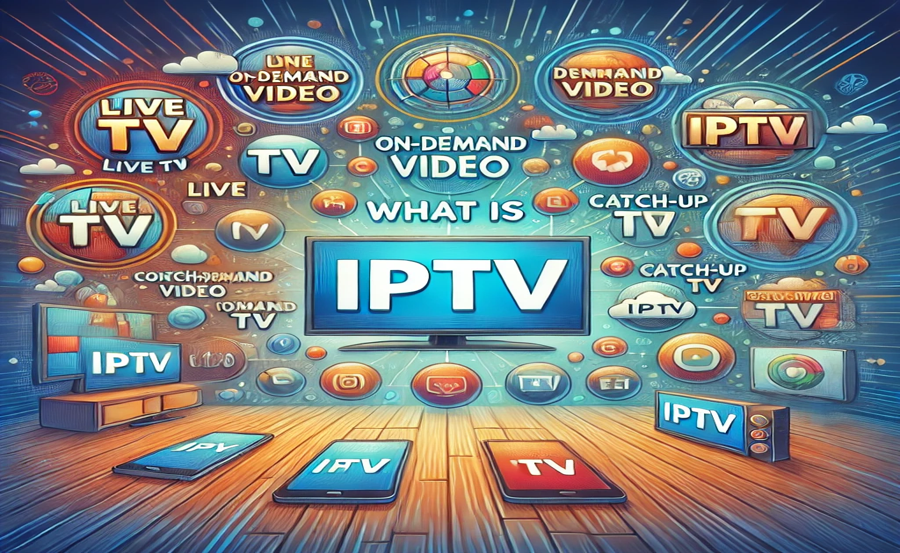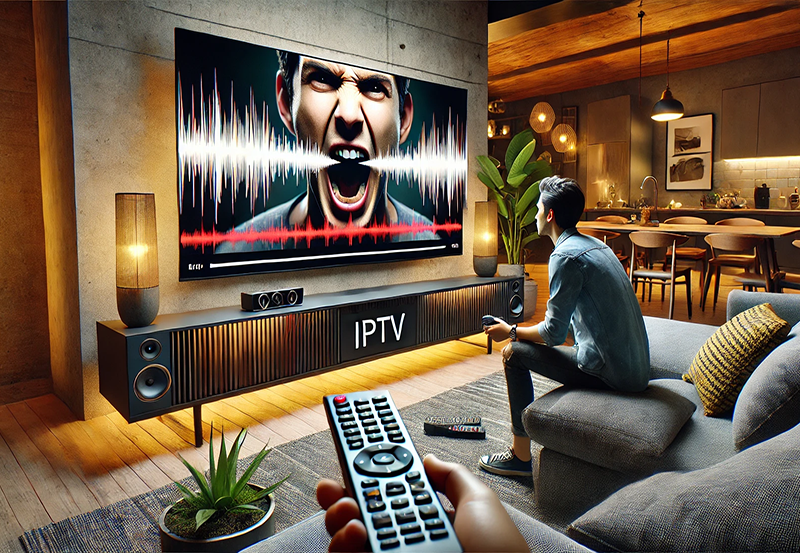IPTV, or Internet Protocol Television, is a technology that delivers television content over IP (Internet Protocol) networks. Instead of using traditional broadcast, satellite, or cable methods, IPTV content is streamed over a stable internet connection, giving viewers access to live TV, on-demand content, catch-up TV, and more.
With IPTV, television signals are delivered digitally, meaning they are converted into data packets and streamed over the internet. As a result, IPTV provides greater flexibility, enabling users to watch TV shows, movies, live events, and other video content on a variety of devices, including TVs, computers, tablets, and smartphones.
How IPTV Differs from Traditional Cable or Satellite
One of the primary distinctions between IPTV and traditional broadcasting methods is that IPTV doesn’t require a physical connection to a television provider through cables or satellites. Instead, IPTV delivers content directly over an internet connection, making it highly accessible to anyone with internet service. This digital transmission not only makes IPTV more versatile, but it also allows for interactive features, more customized programming, and on-demand options.
For viewers, this means that their internet connection can now support multiple entertainment needs—browsing the web, emailing, streaming videos, and watching TV, all through a single connection. With IPTV, you don’t need extra equipment beyond your device (like a smart TV or streaming box) and a reliable internet connection to access an extensive range of television programming and entertainment.
Key Features of IPTV Services
IPTV services come with a range of features that set them apart from traditional television services. Here are some of the most commonly offered options:
- Live TV: Similar to cable or satellite, IPTV offers access to live TV channels, including news, sports, and entertainment, allowing you to watch events in real-time.
- On-Demand Content: With IPTV, you have access to a library of movies, TV shows, and other content, enabling you to watch what you want, when you want.
- Catch-Up TV: Missed your favorite show? IPTV often offers catch-up TV, which allows you to access shows up to seven days after they air.
- Start-Over TV: Many IPTV services allow you to start a program from the beginning, even if it’s already in progress. This feature is perfect for people who tune in late but still want the full viewing experience.
- Interactive Features: Some IPTV providers add interactivity to their services, enabling users to engage in polls, participate in games, or even shop through their IPTV platform.
- Electronic Program Guide (EPG): IPTV services often include an EPG, which shows a complete schedule of channels, times, and programs. This allows you to browse upcoming shows and schedule recordings in advance.
- Parental Controls: IPTV services frequently include parental control options, letting you restrict access to certain channels or content categories, making it ideal for families with children.
Advantages of IPTV over Cable or Satellite
Switching from traditional cable or satellite TV to IPTV offers several notable benefits:
- Cost Savings: IPTV services tend to be more affordable than cable or satellite packages, often providing more extensive channel options for a lower monthly fee. Many IPTV providers also allow users to pay only for the channels they want.
- Greater Flexibility: IPTV enables you to watch TV on any device with an internet connection, giving you the freedom to watch your favorite content on a tablet while traveling, on a smartphone during your commute, or on a big screen in your living room.
- Increased Content Variety: IPTV services often include a broader range of international channels and on-demand content, catering to a more diverse audience.
- Enhanced Viewing Experience: Unlike cable or satellite TV, IPTV services can often support higher-definition video (HD or 4K) without requiring specialized equipment, as long as you have a sufficient internet speed.
- Personalization and Interactivity: IPTV allows for a more customized viewing experience. You can select your favorite channels, adjust viewing settings, access interactive features, and explore a personalized library of content that reflects your preferences.
Top 5 Best IPTV Services to Try Right Now
When choosing an IPTV service, it’s essential to evaluate your viewing needs, preferred channels, and desired features. Here are some of the best IPTV services available, each with unique offerings and pricing structures:
- Rapid IPTV – Known for its wide selection of international channels and stable streaming quality.
- Gen IPTV – Offers an extensive channel lineup with a focus on HD and 4K content.
- Best Buy IPTV – Known for competitive pricing and user-friendly setup for beginners.
- King IPTV – Offers a mix of live TV, sports channels, and on-demand content.
- IPTV Stack – Provides multi-device support and a large video-on-demand library.
IPTV Glossary: Key Terms to Know
General Terms:
- IPTV (Internet Protocol Television): The delivery of television content over the internet.
- OTT (Over-the-Top): A content delivery model where content is streamed directly to viewers without requiring traditional TV providers.
- VOD (Video on Demand): Allows users to watch content whenever they choose, with no time restrictions.
- Catch-Up TV: A feature that allows users to access previously aired content, typically up to seven days after it airs.
- EPG (Electronic Program Guide): A digital listing of available programs, providing users with scheduling information for live TV.
- STB (Set-Top Box): A device that connects to your TV, often used with IPTV services to access channels and content.
- MAC Address: A unique identifier for a device within a network, often required by IPTV services to activate accounts.
- Bitrate: The rate at which data is transmitted. Higher bitrates generally mean better video quality.
Technical Terms:
- Codec: A device or program that compresses video or audio for faster transmission. H.264 and H.265 are common codecs for IPTV.
- Resolution: The display quality, such as 720p, 1080p, or 4K, affecting the clarity of the video.
- Frame Rate: Refers to the number of frames displayed per second in video playback. Higher frame rates generally result in smoother video.
- Buffering: Temporary storage used to prevent interruptions during streaming, typically experienced due to network congestion.
- Latency: The delay between the transmission and reception of data, impacting the streaming experience, especially for live content.
- Bandwidth: The volume of data transmitted per second; a higher bandwidth generally leads to better streaming quality.
Subscription and Services:
- M3U Playlist: A text-based file format containing URLs for IPTV channels.
- Provider: The IPTV service provider that offers channels, playlists, and on-demand content.
- Subscription: A paid plan that provides access to IPTV content, often renewed monthly, quarterly, or annually.
- Free IPTV: IPTV content that’s available without cost, though often unreliable or limited in scope.
- Channels: The various live TV options provided within an IPTV service.
- Packages: Different bundles offered by providers, allowing users to select specific sets of channels based on preference.
- Trial: A limited-time offer allowing users to test the service before committing to a paid subscription.
Choosing the Right IPTV Provider: Key Considerations
If you’re considering making the switch to IPTV, here are some essential factors to consider before subscribing:
- Content Variety: Look for a provider with a channel lineup that meets your interests, whether it’s sports, news, international content, or on-demand shows.
- Service Reliability: Stability is crucial for live TV streaming, especially for live sports or news broadcasts.
- Device Compatibility: Check if the IPTV provider is compatible with your devices, such as your smart TV, streaming box, or mobile device.
- User Interface: A user-friendly interface can enhance your experience, making it easier to browse, select channels, and set up favorite lists.
- Customer Support: Good customer support can make a significant difference, especially when troubleshooting or configuring your IPTV service.
- Pricing and Subscription Flexibility: Look for a provider with competitive pricing, trial options, and flexible subscription plans.
Final Thoughts
IPTV represents a dynamic shift in how we consume television content, offering greater flexibility, customization, and variety compared to traditional cable or satellite TV. The continued growth of IPTV reflects the increasing demand for accessible, affordable, and versatile viewing options. If you’re thinking of switching to IPTV, evaluate the providers, compare features, and consider how IPTV aligns with your viewing habits.
With the right IPTV provider, you can enjoy a tailored entertainment experience that suits your lifestyle and preferences. From live TV to extensive on-demand libraries, IPTV offers a wealth of content at your fingertips, ready to watch wherever and whenever you want.
what is IPTV smarter and how can install?




